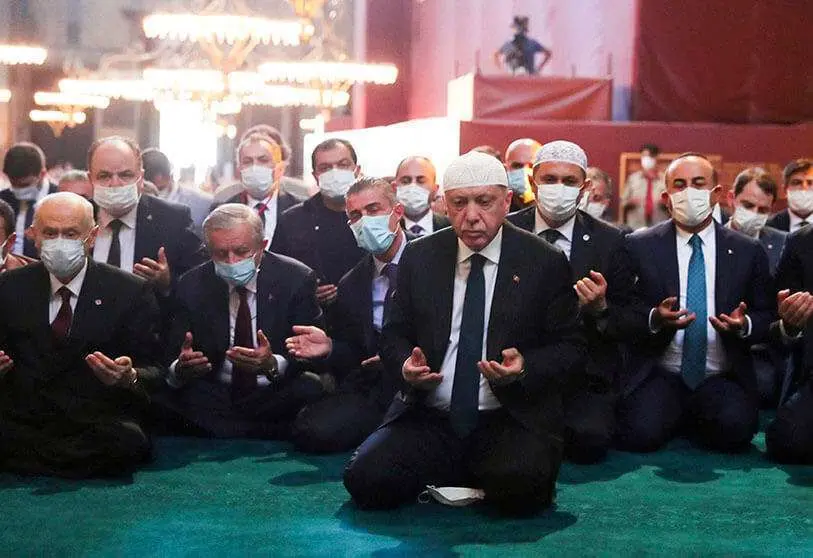What did Erdogan do with Ataturk's laicism?

The question of the title, while ironic, also has a structuring character that I would like to give to this writing. The Turkey that we knew, that of common values, of inter-religiousness, inter-religious dialogue and peaceful coexistence, is being diluted as the Islamism imposed by the country's government, under Erdogan, advances.
Laicism had served for years to give citizens wings and freedom, whatever their creed, simply because of their citizenship and their possibility of choice. Although the Turkish religious tradition is Muslim (and although many misunderstand "laicism" as "atheism", concepts that are far removed from meaning and significance), the reality is that moderate Islam was the one that shone through and which, despite the more or less archaic cultural traditions, did not prevent it from living in harmony with the rest of the non-Muslims.
A secular state is neutral with respect to religion, always within clear legal frameworks, so there is no interference by the state in a moderate and peaceful Islam that is not affiliated with Islam as a political doctrine.
Laicism is not an ideological war against Islam (even though the fruitful propaganda of Islamist parties and groups have tried to promote it), it protects the freedom of religion, conscience and spirituality that is so closely linked to the identity of many citizens, and that despite being a minority in many cases, they have the right to exist and live in freedom by expressing what they believe or do not believe.
The ambition of the Islamic governments to impose rules and laws of Islamic origin, are no more than an implicit coercion towards the citizens to go towards a certain aspect of ideals, those in which all those who do not believe in religiosity as a means of imposing order are excluded in the first place, and in the second place, those who do not share the majority creed in spite of having been born in this case Muslims.

The saddest part of this process of destroying a system that benefited society as a whole is that secularism is not improvised and is born of a long process of education, awareness and training that has nothing to do with indoctrination but gives citizens sufficient tools to be free in a "secular state". Once this process has been completed, it is essential to put into operation the institutions and norms that this new "legal regime", which is of course secular, implies.
For countries like Morocco, Turkey has been a great reference point for lay intellectuals. First of all, with the figure of Mustafa Kemal or Atarturk (1881-1938) founder of the secular republic, a military man by training, he carried out a revolution in a few years in Turkey. On November 4, 1922, he had the Grand National Assembly (GAN) vote the abolition of the sultanate. On October 29, 1923, he proclaimed the republic in which he was appointed president. On 3 March 1924 the GAN confirmed the abolition of Khalifat, and in the same year all Islamic religious courts were abolished and replaced by purely civilian jurisdictions. On 30 April 1924, a secular constitution was adopted and in 1925 marriage ceased to be religious and became civil, granting the possibility of marriage of people of different faiths, which was not possible before, polygamy was also abolished and finally in 1934 Turkish women had access to the vote.
We can summarise the revolution carried out by Ataturk as a completely necessary reform so that civil and social rights, as well as the principles of equality, began to be a tangible reality, and were never behind any religious principle. And this did not prevent him from being the one who, after all these reforms, decided to finance the imams and the mosques, in exchange for controlling them to avoid extremisms that would undermine the principle of the secularity of the State.
However, after this revolutionary legacy of rights and freedoms, and despite the various religious revolts between 1925 and 1930, the civil and secular system remained in place until 2002, when an Islamist party decided to dominate the public arena without any respect for political pluralism, which more than explains the lack of respect with which it deals with and pursues public freedoms, wiping out the separation of the religious and the political.
Although an Islamic Republic has not been declared, as happened in the 1970s after the Iranian revolution, (in which nobody would have bet that it would be so oppressive to the population), which claimed many lives of people who defended freedom of conscience and left dramas such as the rapes in prisons of Christian women and women of other faiths by marriage for hours (permitted in the Shiite tradition) after forcing them to convert to Shiite Islam, we should not therefore perceive governmental Islamism as a simple bluff.
The re-Islamisation of the Basilica of Saint Sophia is just one example, together with the multiple repression of journalists, persecution of Kurds, etc. ... that gives us an idea of the direction that the country of the Bosphorus is taking, if it has not already taken it.
The imposed Islamisation does not respond to the will of the majority of moderate Turkish Muslims, but it does respond to the desire to gain more power, to the ambition to gain more ground within the 'old country of tolerance', in the name of an Islamism that not only fails to protect, but also separates thousands of people day after day, forcing them to confront each other.

